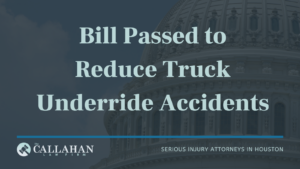Bill Passed to Reduce Truck Underride Accidents

A new bill has been passed in hopes of lowering the number of underride accidents that occur on American roads. The Insurance Institute for Highway Safety and Highway Loss Data Institute (IIHS-HLDI) reported that one in 10 roadway deaths is caused by or involves a truck or 18-wheeler. Truck accidents can be extremely dangerous and often fatal due to the weight and mass of these large trucks. One type of trucking accidents, underride accidents, is reported to be at a ten-year high for truck fatalities, and researchers estimate that 4 in five deaths from crashes with the back or side of an 18-wheeler involve underriding.
What is an Underride Accident?
An underride accident is a type of truck accident that occurs when a smaller vehicle crashes into a truck or 18-wheeler and then slides underneath it. Due to the vast difference in size and weight of an 18-wheeler and a standard vehicle, truck underride accidents are usually serious, and can be fatal. Additionally, truck underride accidents often crush or remove the top of the other vehicle.
The Stop Underrides Act
In 2017, Senator Kirsten Gillibrand and Marco Rubio introduced a bill to the Senate in hopes of addressing this issue, and have since reintroduced the bill twice. The bill, called the Stop Underrides Act, requests that the Department of Transportation require the installation and usage of underride guards on large trucks and trailers weighing over 10,000 pounds. Additionally, the bill would include provisions requiring pre-trip inspections, post-accident inspections, and regular maintenance.
In doing so, Gillibrand hoped that passing the bill would “enact critical, commonsense changes that would save lives on our roads.” Data from a 2012 study shows that underride guards can effectively reduce injury in 75% of side impact truck accidents, while a 2017 study found that adding a side guard helped to prevent underride accidents when test vehicles were traveling at 40 miles per hour. Critics of the bill have argued that the additional weight of underride guards would mean truckers would have to lighten their loads—leading to more trucks on the roads.
The bill was finally passed this year—eight years after transportation officials addressed this issue– and will take effect in 2023. Starting on January 11th of next year, commercial motor vehicles weighing 10,000 pounds or more and for which the bottom of the carriage is higher than 22 inches off the ground will be required to install front, side, and rear underride guards. The guards need to be able to prevent intrusion from a vehicle contacting them at speeds of at least 35 miles per hour.
In a statement, the NHTSA said that this rule is an important part of the Department of Transportation’s 2022 National Roadway Safety Strategy. In a statement released by the NHTSA, Administrator Dr. Steven Cliff stated that the new rule would “improve protection for passengers and drivers of passenger vehicles while also meeting a critical mandate from Congress under the Bipartisan Infrastructure Law.”
To supplement this effort towards stopping underride accidents, the NHTSA is also implementing other provisions in the Bipartisan Infrastructure Law. Some of them include creating a committee on underride accidents to conduct research on underride guards and assess their cost and efficacy, including underride accident data in state crash systems to help educate and prevent, and researching rear impact guards to ensure that civilian drivers are more protected in the case of a truck accident.
—
If you or a loved one has been injured in a truck accident, contact The Callahan Law Firm today to speak with one of our Texas Truck Accident Lawyers. We have a history of successfully representing injured people and their families, and we can help you too. Give us a call at 713-224-9000, or fill out our contact form here.

Michael S Callahan is an attorney and founder of The Callahan Law Firm. He focuses his practice on representing individuals and families in personal injury cases involving motor vehicle and truck accidents, workplace accidents and defective products. With over 25 years of experience, he is dedicated to fighting on behalf of people whose lives have been forever altered by the negligence and carelessness of corporations and individuals. Originally trained as a mechanical engineer, Michael has been practicing law and fighting for justice for those who need it most since 1994. He is board-certified in Personal Injury Trial Law by the Texas Board of Legal Specialization and a member of various esteemed legal associations. Outside of work, Michael enjoys spending quality time with his family, outdoor activities, and continually striving to improve as a trial lawyer and human being.











